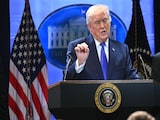- Canada Industrial Relations Board declared Air Canada flight attendants' strike illegal
- Strike affects 130,000 travellers daily during peak summer season at Canada's largest airline
- Flight attendants defied return-to-work order and rejected government-directed arbitration
The Canada Industrial Relations Board declared a strike by 10,000 Air Canada flight attendants illegal Monday and ordered them back on the job after they ignored an earlier order to return to work and submit to arbitration.
The strike at Canada's largest airline entered its third day on Monday and is affecting about 130,000 travelers per day during the peak summer travel season. The two sides remain far apart on pay and other issues. Air Canada suspended plans to restart operations Sunday after the union defied a return-to-work order and said workers would not go back to work.
"The members of the union's bargaining unit are directed to resume the performance of their duties immediately and to refrain from engaging in unlawful strike activities," the Canada Industrial Relations Board board, or CIRB, said in a written decision.
The board, an independent administrative tribunal that interprets and applies Canada's labor laws, said the union needs to provide written notice to all of its members by noon Monday that they must resume their duties.
It was not immediately clear what recourse the board or the government has if the union continues to refuse.
The panel previously ordered airline staff back to work by 2 p.m. Sunday after the government intervened and Air Canada said it planned to resume flights Sunday evening. But when the workers refused, the airline said it would resume flights Monday evening instead.
Air Canada said in a statement that the union "illegally directed its flight attendant members to defy a direction from the Canadian Industrial Relations Board."
Canadian Union of Public Employees national President Mark Hancock on Sunday had ripped up a copy of the initial back-to-work order outside Toronto's Pearson International Airport, and said members wouldn't go back to work this week.
"Our members are not going back to work," Hancock said. "We are saying no."
Picketing flight attendants chanted "Don't blame me, blame AC" outside Pearson.
Jennifer Kozelj, a spokeswoman for Federal Jobs Minister Patty Hajdu, said Sunday that the minister was closely monitoring the situation.
Hajdu had ordered the 10,000 flight attendants back to work, saying now is not the time to take risks with the economy and noting the unprecedented tariffs the U.S. has imposed on Canada. Hajdu referred the work stoppage to the Canada Industrial Relations Board.
The airline said the CIRB has extended the term of the existing collective agreement until a new one is determined by the arbitrator.
Air Canada operates around 700 flights per day. Flight attendants walked off the job around 1 a.m. EDT on Saturday. Around the same time, Air Canada said it would begin locking flight attendants out of airports.
The bitter contract fight escalated Friday as the union turned down Air Canada's prior request to enter into government-directed arbitration, which allows a third-party mediator to decide the terms of a new contract.
Last year, the government forced the country's two major railroads into arbitration with their labor union during a work stoppage. The union for the rail workers is suing, arguing the government is removing a union's leverage in negotiations.
Passengers whose flights are impacted will be eligible to request a full refund on the airline's website or mobile app, according to Air Canada.
Air Canada and CUPE have been in contract talks for about eight months, but they have yet to reach a tentative deal. Both sides have said they remain far apart on the issue of pay and the unpaid work flight attendants do when planes aren't in the air.
The airline's latest offer included a 38% increase in total compensation, including benefits and pensions, over four years, that it said "would have made our flight attendants the best compensated in Canada."
But the union pushed back, saying the proposed 8% raise in the first year didn't go far enough because of inflation.
(This story has not been edited by NDTV staff and is auto-generated from a syndicated feed.)















